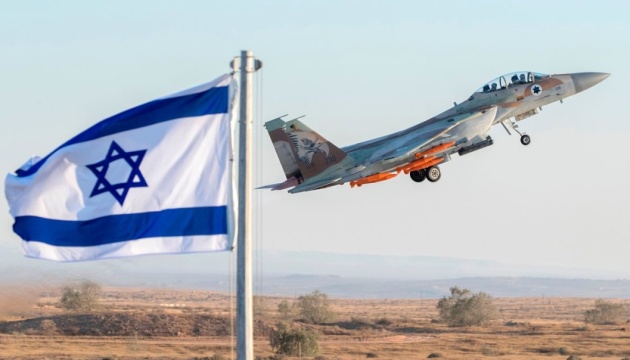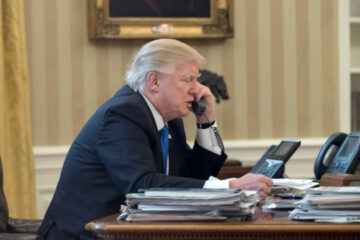
Major issues: oil prices, Russian influence on Iran… And the “loss” of interest in the war in Ukraine is nonsense. Because it is one and the same war
A full-fledged Israeli attack on Iran is just as much of an “declared” war as the Russian “Special Military Operation” against Ukraine is: everyone knew it would break out and even predicted the time quite accurately.
There is another point worth recalling here: on April 12, U.S. President Donald Trump actually issued an ultimatum to Tehran: if a new nuclear deal is not reached within 60 days, something like a “different reality” will come for Iran. It did come on June 13 – exactly 60 days later. Did Trump finally keep his word? Rather, Israel used his word to finally eliminate the deadly threat that had been hanging over the stronghold of the democratic world in the Middle East for many years.
That is, it’s not worth getting offended by a partner, even if it is a situational one, but just try and find a way to interpret the partner’s moves and statements in a way that suits your own interests. This is the first lesson Ukraine has to learn from what is happening. And we cannot say that these are just words. Israel is doing things for which it has the strength and the ability, and Ukraine uses its capabilities for the same purpose. Spider Web drone operation is a confirmation of this.
Fears that a major war in the Middle East will again distract attention from the war in Ukraine have also lost their relevance. This had already happened to us after the administration of the 47th U.S. president came to the White House. We have encountered an apparently unfriendly attitude towards us from the most powerful state in the world, but Ukraine, with the help of its allies in Europe, is holding the frontline and will continue holding it.
What is fundamentally important is that Israel, following Ukraine, has dealt a powerful blow to the Axis of Evil — Moscow – Tehran – Pyongyang – Beijing. It is clear that this is not yet a part of some shared plan, bit in vain. This is hopefully a matter of the future, and not too distant one. How can a war in the Middle East “distract attention” from Ukraine, when it is one and the same war waged by totalitarianism against democracy? The West seems to have already understood this…
Iran is one of Russia’s closest allies, hence our adversary. We do not know to what extent it is currently involved in the barbaric Shahed drone attacks on Ukraine, but it is the first to bear responsibility for those attacks. Will Tehran now be able to continue providing any military assistance to Russia? It’s highly unlikely.
Will Russia help Iran? It depends on where the war ends up. If it ends up with the total defeat of Iran (and we hope so), then this is extremely unlikely. It will be clearly demonstrated to the civilized world what an alliance of neo-fascists of the 21st century is really worth (after all, they recently signed an agreement “on strategic partnership” with pomp and circumstance!), how durable it is. Because it is a “cardboard tiger” that can and must be put in its place by a consolidated effort.
And oil prices – they have risen and will fall back. For this, we just need to wait until the Iranian regime’s nuclear claims are eventually fully harnessed.
We note that our view of the situation coincides with our experts’ in some aspects and alters in others. It is quite normal, it will be interesting to continue our communication.
And for now, let’s wish Israel a quick victory, preferably with minimal losses and without bad consequences.
Four threats to Ukraine: how real are they?
The fresh escalation in the Middle East is not so much a separate crisis as a symptom of a deep erosion of the world order, which creates a zone of increased turbulence for Ukraine. According to the assessment of defense and policy analyst Mykhailo Samus, we are observing another stage of the collapse of the post-WW II system, where “formal institutions such as the United Nations have long since lost their ability to act.” This vacuum of power and influence is exacerbated by the indecision of the key global player. The actions of Israel, who delivered the strike in defiance of Washington’s position, demonstrate that the United States is losing its leverage. As Mr. Samus ironically notes, the Trump administration has chosen a tactics of evading difficult decisions, known as TACO (Trump Always Chickens Out), which is directly projected onto the Russo-Ukrainian war. This is a rather “cunning” idiom that is difficult for non-native speakers to understand, but it describes Trump’s tendency to make threats only to later delay them as a way to increase time for negotiations. But where this concerns Israel’s attack on Iran, for Ukraine this fact may take on a different meaning. That is, it seems, there is no need to hope for increased American pressure on Moscow in the short term, the base scenario for Ukraine remains a grueling confrontation by own power and with the support from closest partners. But anything can happen. And this will depend above all else on the steps Ukraine will take, having the appropriate arguments and capabilities.
The consequences for Ukraine are unfolding at several levels at once. First, there is an inevitable shift in informational and political focus. Political analyst Ihar Tyshkevych believes that an exchange of missile strikes between Israel and Iran will be “a more ‘attractive’ topic for the media,” pushing the Ukrainian agenda to the periphery. This creates a paradoxical situation: on the one hand, lesser international attention may free Ukraine to strike deep into Russian territory, on the other, the Kremlin will have similar freedom of action.
Secondly, a direct threat arises to the amount of military aid provided to Ukraine. Both experts, Ihar Tyshkevych and Maksym Yali, warn of the risk of military supplies being redirected to the Middle East. Tyshkevych recalls the precedent involving 20,000 missiles that were redirected to Israel even before the current escalation, while Mr. Yali suggests that the new conflict “will become another reason for the White House Administration to talk about not continuing military aid to Ukraine.” In fact, the war in the Middle East provides a convenient political cover for reducing support for Kyiv. However, we note that Ukraine, together with its proved allies, has been preparing for such a scenario for a long time and has already achieved something – both in terms of its domestic defense industrial capability and in ensuring financial sustainability.
Thirdly, economic pressure on Russia may weaken. Many analysts share the view that the escalation causes oil price to rise, which directly increases the Kremlin’s revenue. Maxym Yali emphasizes that this eliminates one of the key levers of US influence on Russia, which it used to force Moscow into negotiations. This, supposedly, gives Moscow additional resources to continue its summer offensive campaign and eliminates hopes for achieving a freeze on the war any time soon. But first, the rise in oil prices is directly related to the duration of the war in the Middle East. Second, the decline in energy prices is caused not so much by political factors as by economic ones. And, third, let’s not forget that the G7 still considers capping the price of Russian oil at USD 47 per barrel without the U.S.’s consent.
We do not undertake to predict what the situation will look like in a week’s time
Relations between Moscow and Tehran are a complex symbiosis of situational partnership and strategic calculation, where Russia uses Iran as a tool in its global game. Although formally, according to Mykhailo Samus, the two countries have ratified the Comprehensive Strategic Partnership Agreement with a commitment to mutual assistance, in practice, the Kremlin will not rush to intervene in the conflict on the side of Iran. Instead, the Kremlin has already received from this partnership an important tool in its war against Ukraine – production technologies for Shahed drones, which have become a symbol of Russian air terror. Ihar Tyshkevych believes that, in the future, Moscow and Tehran are unlikely to trade in ready-made arsenals, since both are conducting active hostilities, but the exchange of technologies for the development of their own production capacities will probably rise. If, of course, Israel stops short of completely destroying Iran’s technological and military capabilities, and it seems to be aiming exactly for that.
For the Kremlin, however, the main value of Iran lies not in the military domain, but in the geopolitical one. Mr. Samus explains that Russia was actively selling the West, primarily the USA, the illusion of its influence on Tehran. This is a classic tactic of Putin, aimed at dragging out time and diverting attention. “Here’s a striking example of that: during negotiations with Trump, where the latter tried (albeit very gently) to put pressure on Putin regarding Ukraine, Putin suggested: “Do you want me to help with Iran?”. While Washington considers Russia as a potential mediator, the Kremlin is buying time to continue its aggression against Ukraine. And again, the scenario according to which the situation in the Middle East has developed shows something else: Russia might have influenced Iran, but on the contrary – pushing it to be intransigent in negotiations with the USA regarding its nuclear program. So it’s curious to see how Moscow will influence Tehran now.
This crisis opens up a whole window of opportunity for Russia, believes Ihar Tyshkevych. Supposedly, Moscow will try to “sell” its mediation services to the United States, demanding concessions on the Ukrainian issue in return. But in our opinion, Russia’s prospects lie in a different domain. And here we can fully agree with the expert that instability in Iran threatens the southern route of the Chinese One Belt One Road Initiative, which automatically increases the importance of the northern route that runs through Russian territory. This gives strength to Moscow’s position in its dialogue with Beijing. The conflict also creates risks for energy projects that compete with Russian ones, in particular for bringing Turkmen gas to the European market via the Caspian Sea and Turkey. The slowdown of this project is in the direct interest of the Russian Federation. Thus Russia, while technically remaining on the sidelines, becomes one of the main beneficiaries of the Middle East escalation.
But this assessment is relevant for today, June 13, 2025, and hardly anyone will dare to predict how it will look like in a week’s time.
Serhiy Tykhy, Myroslav Liskovych. Kyiv
Source: Israel-Iran war and what impact it may have of Russia’s war in Ukraine



